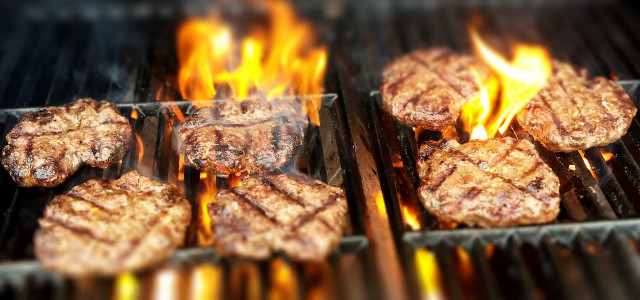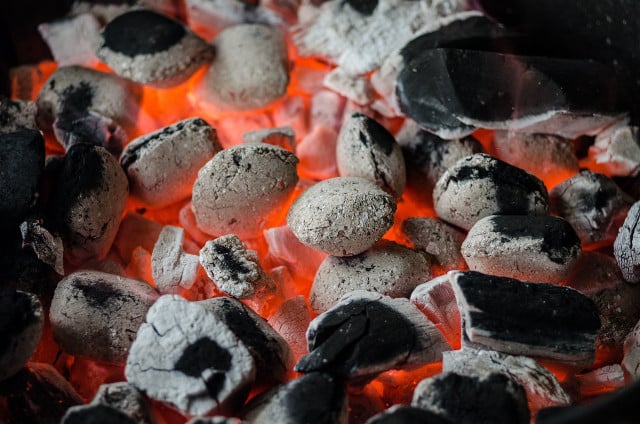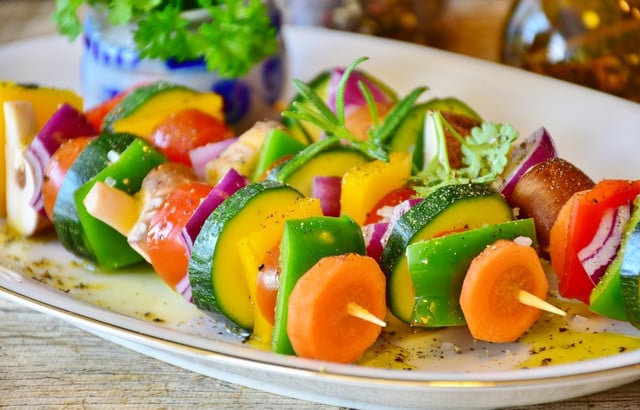
When grilled meat burns, harmful substances are produced that can harm our health. You can find out what causes this and what you should consider when grilling here.
Summer is barbecue season and many people associate it with grilled sausages, steaks and other meat products. In this case, however, meat is not only harmful to the climate and is usually associated with animal suffering and poor working conditions, but can also affect our health. This applies all the more to grilled or roasted meat and fish.
Because when it is very hot, two harmful groups of substances form in these foods, as the German Cancer Research Center writes: the polycyclic aromatic hydrocarbons (PAH) and the heterocyclic aromatic amines (HAA). According to current scientific knowledge, these substances promote the development of tissue changes in the large intestine. These so-called adenomas are a special precursor of colon cancer.
These pollutants are produced when grilling
How harmful HAAs are to intestinal health has been known in science for many years. In a study by the German Cancer Research Center, subjects with the highest HAA content in their diet had a 50 percent higher risk of tissue changes in the colon – compared to the comparison group with the lowest HAA intake.
HAAs are formed when amino acids and proteins are heated to high temperatures. They mainly form at temperatures above 150 degrees Celsius. They are especially common on the surface of overheated meat and fish. The following applies: the longer and more intensely they were exposed to the heat, the higher the HAA content.
PAHs are formed when food is exposed to high temperatures and comes into direct contact with open flames or fumes. This is particularly easy to do when grilling. So it is not uncommon for fat or marinade to drip onto the charcoal and the meat products to be smoked on the grill. Dousing the grilled food with beer also releases PAHs. If you look closely, you can see this in the form of bluish smoke. The smoke with the pollutants either settles on the meat products or is inhaled.
Grilled meat: other health disadvantages

(Photo: CC0 / Pixabay / Skitterphoto)
In addition to the pollutants that can be produced when grilling, meat also contains other ingredients that have a negative effect on health. According to the Apotheken Umschau, these include cholesterol, saturated fatty acids and purines. The German Society for Nutrition (DGE) therefore recommends eating no more than 300 to 600 grams of meat per person per week. This roughly corresponds to the amount of two to four sausages.
You should also avoid burning vegetables and vegan meat substitutes when grilling. Depending on the food, PAHs, HAAs or other harmful substances such as acrylamide can also be produced.
Healthy grilling: tips and hints

(Photo: CC0 / Pixabay / RitaE)
With these tips you can grill without generating a variety of pollutants:
- The basic principle is: “The gentler, the better”. Especially with meat products, but also vegetarian grilled food and vegetables, make sure that they are not grilled too hot or too long. In general, you should make sure that the temperatures on the grill do not get too hot.
- The smoke from an open fire contains a high proportion of PAHs. From a health point of view, an electric or gas grill is therefore more advisable. These are also more environmentally friendly than grilling with charcoal. More about this here: Gas grill, kettle grill, electric grill: Which grill is the most sustainable?
- If you still want to grill with charcoal, make sure that it is already well lit before you start grilling. From an ecological point of view, it is also advisable to use sustainable charcoal.
- Did your grilled food get charred once? Then cut off black areas generously.
- Make sure that the grill grate is as far above the coals as possible so that the flames cannot easily touch the grilled food.
- A grill tray is recommended to prevent food from coming into contact with the open flame or smoke gases. However, these are often made of aluminum and are therefore very harmful to the environment during production and cause a lot of waste. Reusable grill grids, grill boards or grill baskets are recommended. Alternatively, you can simply place a cast-iron pan on the grill and cook the food in it. You can find more tips here: Grilling without aluminum foil: This is how feta, fish and fresh vegetables succeed
- From a health and ecological point of view, we recommend not grilling any meat or fish products. Instead, rely on substitute products such as vegan sausages and steaks, tofu products and grilled vegetables. You can find more tips in these articles: Grilling without meat and grilling vegetarian: You can do it with these delicious recipes!
Read more on Techzle.com:
- Grilling sustainably – this is how it works: 10 tips from beer to vegetarian
- Health hazard: Which foods do not belong on the grill
- Grilling tofu: recipe for vegan grill skewers